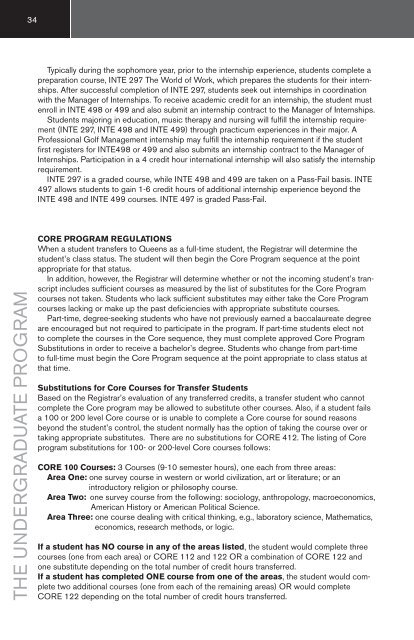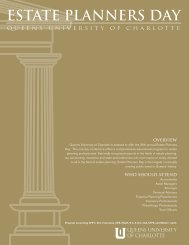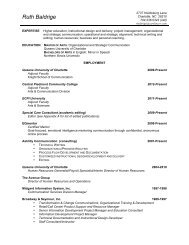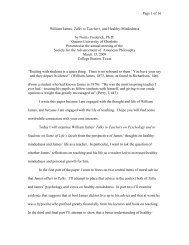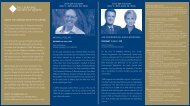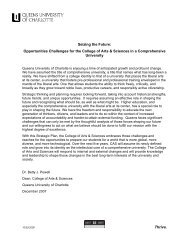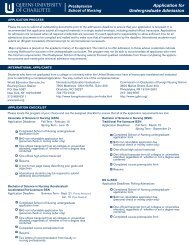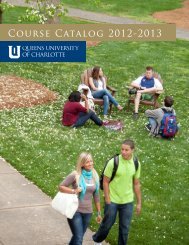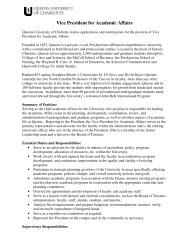2008-2009 Academic Catalog - Queens University of Charlotte
2008-2009 Academic Catalog - Queens University of Charlotte
2008-2009 Academic Catalog - Queens University of Charlotte
You also want an ePaper? Increase the reach of your titles
YUMPU automatically turns print PDFs into web optimized ePapers that Google loves.
34<br />
Typically during the sophomore year, prior to the internship experience, students complete a<br />
preparation course, INTE 297 The World <strong>of</strong> Work, which prepares the students for their internships.<br />
After successful completion <strong>of</strong> INTE 297, students seek out internships in coordination<br />
with the Manager <strong>of</strong> Internships. To receive academic credit for an internship, the student must<br />
enroll in INTE 498 or 499 and also submit an internship contract to the Manager <strong>of</strong> Internships.<br />
Students majoring in education, music therapy and nursing will fulfill the internship requirement<br />
(INTE 297, INTE 498 and INTE 499) through practicum experiences in their major. A<br />
Pr<strong>of</strong>essional Golf Management internship may fulfill the internship requirement if the student<br />
first registers for INTE498 or 499 and also submits an internship contract to the Manager <strong>of</strong><br />
Internships. Participation in a 4 credit hour international internship will also satisfy the internship<br />
requirement.<br />
INTE 297 is a graded course, while INTE 498 and 499 are taken on a Pass-Fail basis. INTE<br />
497 allows students to gain 1-6 credit hours <strong>of</strong> additional internship experience beyond the<br />
INTE 498 and INTE 499 courses. INTE 497 is graded Pass-Fail.<br />
THE UNDERGRADUATE PROGRAM<br />
CORE PROGRAM REGULATIONS<br />
When a student transfers to <strong>Queens</strong> as a full-time student, the Registrar will determine the<br />
student’s class status. The student will then begin the Core Program sequence at the point<br />
appropriate for that status.<br />
In addition, however, the Registrar will determine whether or not the incoming student’s transcript<br />
includes sufficient courses as measured by the list <strong>of</strong> substitutes for the Core Program<br />
courses not taken. Students who lack sufficient substitutes may either take the Core Program<br />
courses lacking or make up the past deficiencies with appropriate substitute courses.<br />
Part-time, degree-seeking students who have not previously earned a baccalaureate degree<br />
are encouraged but not required to participate in the program. If part-time students elect not<br />
to complete the courses in the Core sequence, they must complete approved Core Program<br />
Substitutions in order to receive a bachelor’s degree. Students who change from part-time<br />
to full-time must begin the Core Program sequence at the point appropriate to class status at<br />
that time.<br />
Substitutions for Core Courses for Transfer Students<br />
Based on the Registrar’s evaluation <strong>of</strong> any transferred credits, a transfer student who cannot<br />
complete the Core program may be allowed to substitute other courses. Also, if a student fails<br />
a 100 or 200 level Core course or is unable to complete a Core course for sound reasons<br />
beyond the student’s control, the student normally has the option <strong>of</strong> taking the course over or<br />
taking appropriate substitutes. There are no substitutions for CORE 412. The listing <strong>of</strong> Core<br />
program substitutions for 100- or 200-level Core courses follows:<br />
CORE 100 Courses: 3 Courses (9-10 semester hours), one each from three areas:<br />
Area One: one survey course in western or world civilization, art or literature; or an<br />
introductory religion or philosophy course.<br />
Area Two: one survey course from the following: sociology, anthropology, macroeconomics,<br />
American History or American Political Science.<br />
Area Three: one course dealing with critical thinking, e.g., laboratory science, Mathematics,<br />
economics, research methods, or logic.<br />
If a student has NO course in any <strong>of</strong> the areas listed, the student would complete three<br />
courses (one from each area) or CORE 112 and 122 OR a combination <strong>of</strong> CORE 122 and<br />
one substitute depending on the total number <strong>of</strong> credit hours transferred.<br />
If a student has completed ONE course from one <strong>of</strong> the areas, the student would complete<br />
two additional courses (one from each <strong>of</strong> the remaining areas) OR would complete<br />
CORE 122 depending on the total number <strong>of</strong> credit hours transferred.


